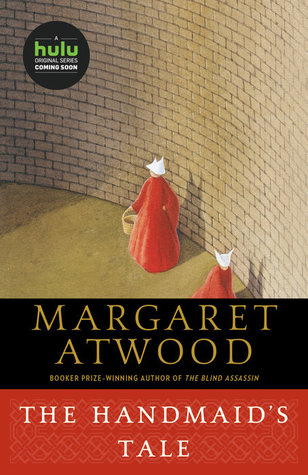 Offred is a Handmaid in the Republic of Gilead. She may leave the home of the Commander and his wife once a day to walk to food markets whose signs are now pictures instead of words because women are no longer allowed to read. She must lie on her back once a month and pray that the Commander makes her pregnant, because in an age of declining births, Offred and the other Handmaids are valued only if their ovaries are viable. Offred can remember the years before, when she lived and made love with her husband, Luke; when she played with and protected her daughter; when she had a job, money of her own, and access to knowledge. But all of that is gone now...
Offred is a Handmaid in the Republic of Gilead. She may leave the home of the Commander and his wife once a day to walk to food markets whose signs are now pictures instead of words because women are no longer allowed to read. She must lie on her back once a month and pray that the Commander makes her pregnant, because in an age of declining births, Offred and the other Handmaids are valued only if their ovaries are viable. Offred can remember the years before, when she lived and made love with her husband, Luke; when she played with and protected her daughter; when she had a job, money of her own, and access to knowledge. But all of that is gone now...
*May Contain Spoilers*
I know I should have read this book way before now, as Margaret Atwood's The Handmaid's Tale has been on my list for a while. But, now I can say that I completed it and it was terrifying in both topic and possibility.
Though this is a popular novel, for those in need of a little summary The Handmaid's Tale takes place in the future after a nuclear fallout. Women are becoming barren and in order to save the species, a strict social structure has been erected in which women are forced to have sexual intercourse with specific men in order to become pregnant. Women who cannot conceive are punished, as well as anyone else who breaks the rules. This creates a dark and frightening setting in which to examine the social ramifications of oppression and loss of equality between the sexes.
Offred is the main character of this dystopian novel and her perspective is interesting because she remembers what it was like "before" and is living what it's like "after." By before, I mean before the fallout and before the stark shift in control and loss of equality. I think her character works both as a warning and an example in Atwood's setting. Before, Offred didn't fight for her beliefs and often ignored her mother's feministic viewpoints, which in turn becomes a symbolic warning against ignoring the issues that we face every day in society. Yet, as an example, Offred does break the rules that the new, more-controlling patriarchy has established, fighting back in small ways that could eventually lead to another shift.
I think readers will feel on the fence about Offred's character. She doesn't do much to push forward, but sometimes a little nudge is all it takes. Offred isn't represented as a brave or courageous character, but she does have moments of resistance. She's kind of presented as being representative of the average woman. Her real name is never revealed and therefore her identity is fluid. This allows readers to see themselves in her and imagine what it would be like if society shifted to force oppression on its members.
The plot of this novel follows Offred for a short time in her third post, post as in household in which she's supposed to become pregnant. Offred shares her memories of what life was life before, her emotional struggle with what she's lost, and her fear for the future. Though it is a controversial book with extreme actions and conclusions, Atwood's novel is definitely one to read. Not everyone will like it, as it isn't the happiest story to share, yet it's applicable to modern society and raises questions that we should be asking ourselves.
Rating: 3.5/5 Cups





No comments:
Post a Comment